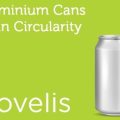The Alupro association has just launched a manifesto demanding that the Extended Producer Responsibility system encourage the use of infinitely recyclable materials such as aluminum. This is one of the requests made by the aforementioned association in its manifesto on aluminum.
The document also includes other relevant issues, including the fact that the United Kingdom has already set ambitious targets and established new legislative frameworks to protect and improve the environment for future generations. A key pillar of this will be how to achieve the transition to a circular economy. However, over the last decade, the recycling rate of aluminum packaging has increased by 30% to reach a record rate of 68% in 2020.
The organization believes that this goal is within reach, but not without a fundamental change in our approach to packaging and waste management. “Much packaging waste is still not recycled or managed sustainably. However, aluminum is infinitely recyclable and is perfect for a circular economy,” they add.
The document also includes other key points such as a world-class recycling system for the United Kingdom, where endlessly recyclable aluminum generates sustainable jobs in a circular economy. To achieve this there must be consistency in curbside collections by local authorities to ensure that all infinitely recyclable aluminum containers are collected for recycling where feasible.
Also local authorities and responsible parties should implement an ambitious recycling and on-the-go collection infrastructure that will greatly increase the collection of recyclable materials when consumed away from home. They should also work with industry to provide consistent communication campaigns that include clear on-pack labeling highlighting the infinitely recyclable nature of all aluminum packaging and reminding consumers to recycle it.
Another important issue is that both the government and responsible parties should implement a well-designed deposit return scheme (DRS) for the UK that promotes the collection of at least 90% of all beverage containers, including aluminum cans, with a variable deposit rate depending on the size of the container to avoid unintended environmental consequences.
In addition, a DRS would impose an additional charge on beverage containers that can be recovered when returned to a collection point. The deposit rate should be variable by container size to mitigate the risk of people seeking larger plastic bottles to avoid paying multiple deposits on smaller endlessly recyclable items, such as aluminum cans in multi-packs.
The ‘closed-loop’ recycling of collected containers, particularly aluminum cans, should also be facilitated to ensure that they are sold to recyclers in a fair and transparent market. Another issue that should not be overlooked is to recognize the role that the high value of aluminum plays in financing the collection of aluminum cans in a DRS and use it to offset the costs of companies forced to use cans only.
Government and responsible parties should implement a well-designed and cost-effective extended producer responsibility (EPR) system with variable fees for producers to recognize and incentivize the use of more sustainable materials such as aluminum. The ‘closed loop’ recycling of packaging that plays a crucial role in the safe delivery of products and the prevention of waste should be encouraged.
Government and responsible parties should support innovation, infrastructure investment and the deployment of proven technologies that facilitate widespread container recycling with accurate reporting of recycling rates, thus ensuring that all infinitely recyclable aluminum can be recovered and generate highly skilled green jobs.













